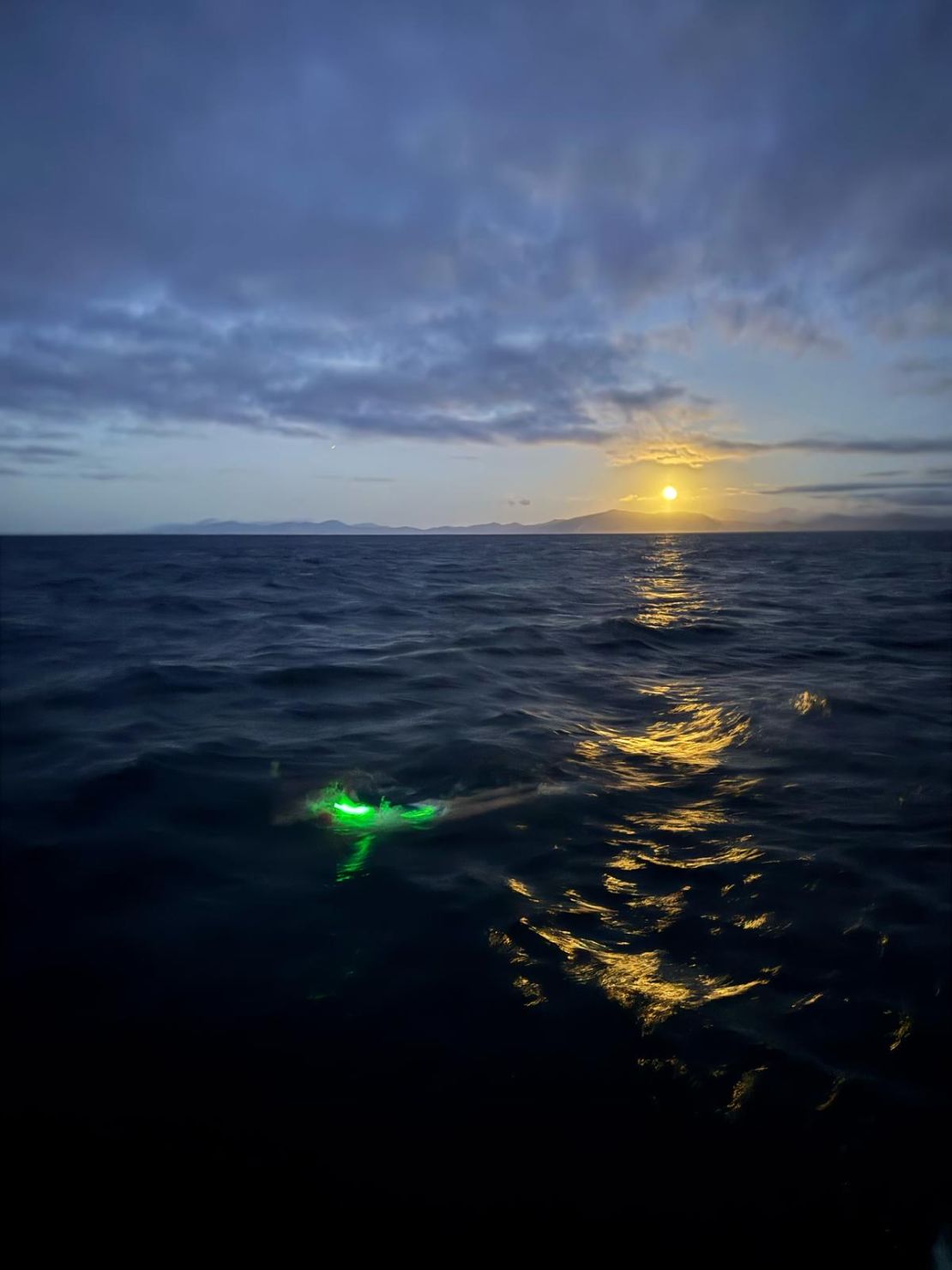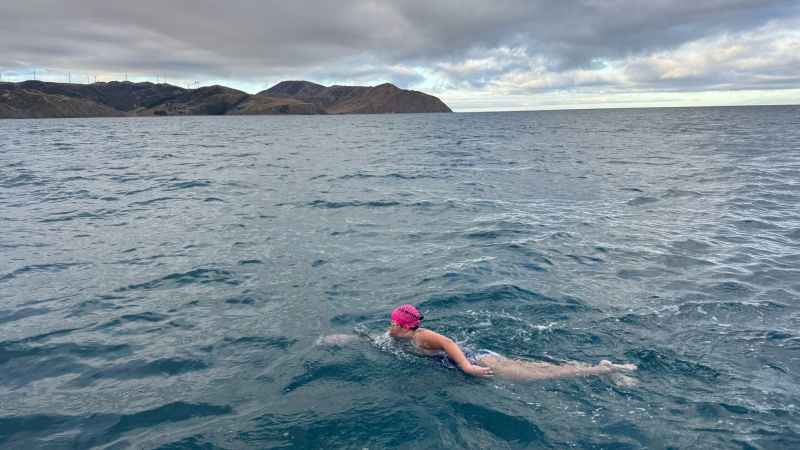CNN
—
Maya Merhige eventually stopped counting her jellyfish stings, such was the frequency with which they were getting scorched against her skin.
At this point, Merhige was already several hours into her 27-mile swim across the Cook Strait in New Zealand and had slowly become immune to the small, burning sensations that covered her body. By the end, even her face – her nose, ears and lips – had been peppered with them.
“Constantly, like 25 times a minute – over and over,” is how often the 17-year-old Californian estimates that she was being stung. That equates roughly to once every third stroke – an aggressive form of exposure therapy for someone who claims to be terrified of jellyfish.
“Even when I was getting in the water, I was already like: ‘I’m so scared. I don’t want to see jellyfish,’” adds Merhige. “So the entire time I was just fighting myself mentally to kind of get over that fear.”
Confronting her greatest fears is something that Merhige has done time and again while swimming in some of the world’s most challenging and unforgiving waters.
Crossing the Cook Strait, which separates New Zealand’s North and South Islands, last month was another step towards her goal of becoming the youngest person to complete the Oceans Seven – a series of brutal open water swims around the globe.
Merhige has now successfully traversed the Cook Strait, the Moloka’i Channel in Hawaii, the Catalina Channel off the coast of Los Angeles, and the English Channel between England and France – all before graduating from high school.
Still on her to-do list are the North Channel between Ireland and Scotland, the Strait of Gibraltar between Spain and Morocco, and the Tsugaru Strait in Japan.
“I’m hoping to be the youngest, which means that I have to do them by January of 2028,” Merhige says. “I am hoping to finish them all. I’m really excited for the ones I have left.”

In line with Marathon Swimmers Federation guidelines, only swimsuits – not wetsuits – can be used by those undertaking solo, unassisted marathon swims in open water.
Merhige is guided by a support boat and pauses to receive a feed from her crew every half an hour. The Cook Strait crossing, she says, was her hardest swim to date – which became clear the following day when she struggled to lift her arms above shoulder height.
The physical toll of taking stroke after stroke for more than half a day was compounded by choppy seas and strong currents, meaning Merhige swam 27 miles instead of 13.7 and was in the water for more than 14 hours instead of the planned seven.
But it was her mental resolve that was tested most of all, especially when the large wind turbines marking the end of the swim never appeared to be getting any closer. The best solution, Merhige thought, was to stop obsessing over the distance and just keep swimming.
It’s one of the reasons she prefers tackling her marathon swims at nighttime, unable to fret about how far she has to go or what sea creatures might be lurking in the ocean below.
“If I can’t see them, I really just tell myself: out of sight, out of mind,” says Merhige – referring, of course, to those much-feared jellyfish. “They’re not there if you can’t see them, so I just pretend it’s not happening, which does help me shut my mind off a little bit.”
Another perk to crossing the Cook Strait at night – which Merhige did for almost the entirety of the swim – was catching a glimpse of shooting stars and avoiding the heat of New Zealand’s punishing midday sun.
And no sun exposure means no risk of sunburn. That’s useful, Merhige points out, if you have your high school prom in a few days’ time and want to avoid arriving with a swimming cap tan across your forehead.

As obstacles go, a poorly-timed tan line is a relatively minor one when it comes to swimming in some of the world’s most dangerous waters.
When swimming the length of Lake Tahoe in 2022, Merhige struggled so much that she started to get hallucinations – “I thought that I had been kidnapped for part of it, thought I was swimming with human-sized stuffed animals,” she says – and had to negotiate sharks, seals, whales and dolphins during her Moloka’i Channel crossing the following year.
But for all the many challenges she encounters during her swims, Merhige still insists that she is happier in the water than anywhere else. It is, she explains, a “safe place” in which she sees herself as a visitor to an environment which isn’t, and will never be, entirely hers.
“It’s become this great relationship,” says Merhige. “I love being in the water so much, and I’m definitely loving it more and more; I have much more respect for the ocean and for the water than I did when I started swimming.
“I’ve done so much mental gymnastics in the water that I can adapt myself to deal with whatever situation occurs. Even if I’m scared, I know I can get through that fear. That’s what keeps me safe, and that’s what makes me feel safe.”
Merhige has now completed 10 marathon swims, which by definition measure at least 6.2 miles (10 kilometers) in length.
With nonprofit Swim Across America, she has raised more than $130,000 for pediatric cancer research, a cause motivated by some of her close family friends who have been affected by the disease.

The thought of those living with cancer is what motivates Merhige during some of her darkest, most grueling hours in the water.
“There are kids in the hospital, literally right now, who are going through chemotherapy and going through radiation, and if they can get through that, then I can keep swimming, and it’s nothing,” she says.
“I’m just telling myself that over and over and thinking: ‘This is bigger than me. There are people cheering me on, and there are people going through cancer that I’m doing this for’ … I know that this is making a bigger impact outside of just me, and that’s really important.”
Merhige, too, has faced her own recent health challenges. In March 2023, she ruptured a benign tumor on her pancreas during a skiing crash, causing intense pain and requiring surgery.
She was back in the water two weeks after the surgery, and then last year, two months after she was in and out of hospital for further treatment, Merhige completed her crossing of the English Channel.
More surgery is on the horizon this summer, meaning another Oceans Seven swim isn’t on the cards this year. That will have to wait until 2026, when Merhige hopes to complete two, maybe three, of the remaining swims during her first year at college.
She’s currently on a pre-med track and hopes to be at a school on the East Coast – the opposite side of the country to her hometown of Berkeley.
“I don’t think any of my top schools are remotely near water,” says Merhige, “but I’m going to find lakes, I’m going to find rivers. I’m going to make it work.”
The water, Merhige adds, is the place where she feels “the most myself,” and she has no intentions to wave goodbye to that part of her identity while at college. But one bonus of being on the East Coast? The jellyfish will be very, very far away.

























